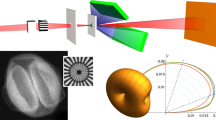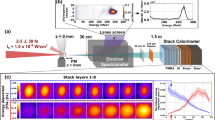Abstract
WE have reported1 observing X-rays diffracted from material which was undergoing shock-wave compression. The shock wave was generated by a conventional high-explosive, plane-wave generator. The four-channel scintillation detector used in that experiment2 demonstrated that diffraction had occurred, but it lacked angular resolution. To make this technique practical, a detector system capable of greater resolution had to be devised, and we have recently constructed a film cassette capable of withstanding the effects of the blast with no appreciable destruction of the film.
This is a preview of subscription content, access via your institution
Access options
Similar content being viewed by others
References
Johnson, Q., Mitchell, A., Keeler, R. N., and Evans, L., Phys. Rev. Lett., 25, 1099 (1970).
Johnson, Q., Mitchell, A., and Evans, L., Rev. Sci. Inst. (in the press, 1971).
Christian, R. H., Rep. 4900, Lawrence Radiation Laboratory, Livermore (1957).
Author information
Authors and Affiliations
Rights and permissions
About this article
Cite this article
JOHNSON, Q., MITCHELL, A. & EVANS, L. X-ray Diffraction Evidence for Crystalline Order and Isotropic Compression during the Shock-wave Process. Nature 231, 310–311 (1971). https://doi.org/10.1038/231310b0
Received:
Issue Date:
DOI: https://doi.org/10.1038/231310b0
This article is cited by
-
Capturing Polymer Chain Compression and Shock Driven Decomposition of Polytetrafluoroethylene During Dynamic Shock Compression with In Situ X-Ray Diffraction
Journal of Dynamic Behavior of Materials (2023)
-
Nanosecond white-light Laue diffraction measurements of dislocation microstructure in shock-compressed single-crystal copper
Nature Communications (2012)
-
Shock deformation of face-centred-cubic metals on subnanosecond timescales
Nature Materials (2006)
Comments
By submitting a comment you agree to abide by our Terms and Community Guidelines. If you find something abusive or that does not comply with our terms or guidelines please flag it as inappropriate.



